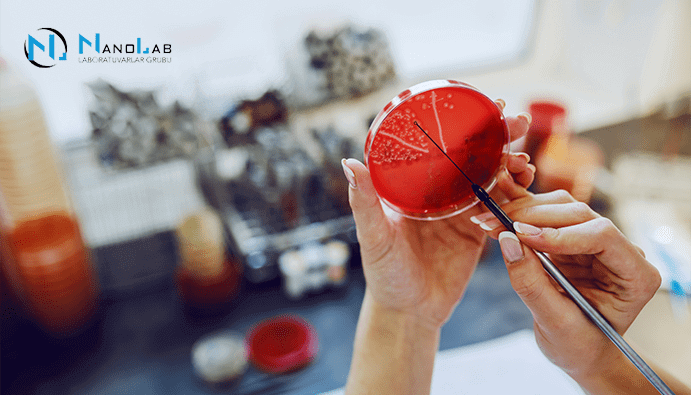Mesophilic Aerobic Bacteria Count: Food Products
Why is Mesophilic Aerobic Bacteria Counted?

Mesophilic aerobic bacteria are microorganisms that thrive in the temperature range 20-45°C and can survive in an oxygenated environment. In the food industry, the enumeration of these bacteria is an important microbiological test to assess the hygienic quality and ensure the safety of products. Mesophilic aerobic bacteria enumeration is usually performed to determine the spoilage potential of food products, monitor storage conditions and ensure food safety.
What are Mesophilic Aerobic Bacteria?
- Mesophilic: This term refers to organisms that can grow in the temperature range between 20-45°C. Mesophilic bacteria are microorganisms that often cause food products to spoil.
- Aerobic: These bacteria thrive in an oxygenated environment. That is, they grow in conditions where free oxygen is present in the environment.
Common Types of Mesophilic Aerobic Bacteria
- Pseudomonas species: The main species of most mesophilic aerobic bacteria. They can cause food spoilage.
- Enterobacteriaceae family: Pathogenic bacteria such as E. coli and Salmonella belong to this family and are critical for food safety.
- Lactobacillus and Streptococcus: They are bacteria found in the fermentation process, but some of them can cause food spoilage.
Effects of Mesophilic Aerobic Bacteria on Food
- Food spoilage Mesophilic aerobic bacteria can multiply rapidly and cause spoilage, especially in foodstuffs such as meat, dairy products, vegetables and fruit. These bacteria can cause acidic tastes, bad odors, discoloration and structural deterioration in foods.
- Food Safety and Pathogens: Some mesophilic aerobic bacteria can pose a threat to human health. For example, pathogens such as Salmonella and Escherichia coli can cause foodborne illness. Therefore, monitoring the numbers of these bacteria is critical for food safety.
- Rapid Replication: Mesophilic aerobic bacteria can multiply rapidly under favorable environmental conditions. High temperatures, humidity and oxygen encourage the growth of these bacteria. Therefore, without proper storage conditions, the number of these bacteria can increase rapidly.
Importance of Mesophilic Aerobic Bacteria Counting for Food Safety
- Food Hygiene Monitoring:mMesophilic aerobic bacteria counts help to determine the level of hygiene in food production processes. High numbers of mesophilic aerobic bacteria may indicate that proper sanitation and hygiene conditions are not being maintained.
- Spoilage Risk Assessment:mHigh bacterial counts indicate that the spoilage process has started and the shelf life of food products is reduced. This enables food manufacturers to take the necessary measures to ensure the freshness and safety of products.
- Pathogen Control: A high mesophilic aerobic bacteria count can also indicate the presence of pathogens. This can increase the risk of the presence of pathogens, especially Salmonella and E. coli, so appropriate protective measures should be taken.
- Monitoring Storage Conditions: A mesophilic aerobic bacteria count can be performed to monitor whether appropriate temperature and humidity conditions are maintained during storage of food products. It should be noted that high temperature and humidity promote bacterial growth and can threaten food safety.
Nanolab Laboratories Group continues to provide services within the scope of Mesophilic Aerobic Bacteria Count. We also provide services in Anaerobic Bacteria Enumeration.
Contact us for more information.
You can follow us on LinkedIn for up-to-date news and posts about our services.
Follow our Instagram account to be informed about our latest blog posts.

